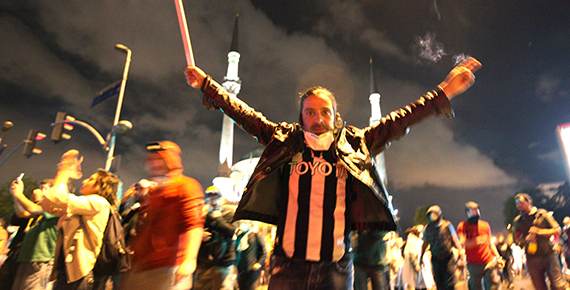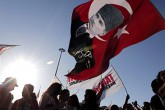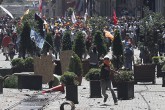After four weeks have passed since the Gezi Park protests, a retrospective look at the incidents tells us the fact that although the protests were neither at the scale nor at the strength of a popular revolution, they have gone down into our political history as a case study to be examined thoroughly in terms of our political tradition and structure.
“A blend of opposition” occurring during the incidents centered around the Gezi Park does not promise a political future, but tactically has found a new channel to make itself visible in the public eye. The spread of protests seemed as the result of the excitement of being felt and visible, rather than an ideological or political closing-up among different groups. For this reason, the street and social opposition as an amalgamation of the last warriors of an ideological specter of a by-gone-era, the masses of remnants of the social grassroots of the tutelary system, and the groups mostly of youngsters with various sensitivities and tendencies have been able to converge at the same square for three weeks.
Although the opposition that initially emerged at the Gezi Park was quite creative yet destructive, it lacked foundational and integrating features. For this mass participating in a political demonstration for the first time in their life, a uniting and integrating political thought was replaced by some sensitivities. The lack of a political opposition to represent these sensitivities caused the emergence of a movement where tactical and methodological achievements determined political targets and the road map. In this angle, it was quite meaningful to note that the best expression representing the Gezi Park opposition was “Kahrolsun Bağzı Şeyler” (Damn Some Things!) Yet another element which put the Gezi Park opposition into a hard spot was the fatigue in the implementation of the resistance tactics; but more importantly, it was also the ineffectiveness or inefficiency of the impact of these tactics when applied against a government which has national democratic legitimacy, although they could be very effective against the weakest ring – nonlegitimacy – of authoritarian governments.
When the opposition parties tried to instigate the political situation and put the burden of their frustrations of losing in elections and of their ideological baggage on these youngsters, the situation was badly botched up . Digital groups who are mobilized through social media suddenly fell into an analog and old-fashioned discourse and therefore caused a change in the nature of the problem and its discussion. After the police intervention in the park, the “standing man” strategy helped this opposition to re-mobilize as it found a new path to follow in terms of tactics but failed to find a political path to follow equally productive, and resumed in a state of not being able to express what they really want. Although such lack of politics was dubbed to be the real power of the Gezi Park opposition, not being able to represent and express itself in the current and legitimate political system, the protests started to be re/defined, hijacked or even owned by others (other factions and fractions) as such is the case typically.
The Gezi Park incident also means the first test of the government against a new type of political citizenship which tries to take charge of the political representation as a result of the alienation against the current political parties and tries to create a political position in a sphere provided by the global social media. This new dynamics, which is able to launch social movements through social media organizations and gather around certain slogans, cannot be understood by the codes of traditional political struggle. Besides, the answers to these kinds of social and political movements are based on traditional political patterns; therefore two different political languages on different frequencies ensue. As the political power tried to understand the new frequencies, the most destructive impact of the pro



